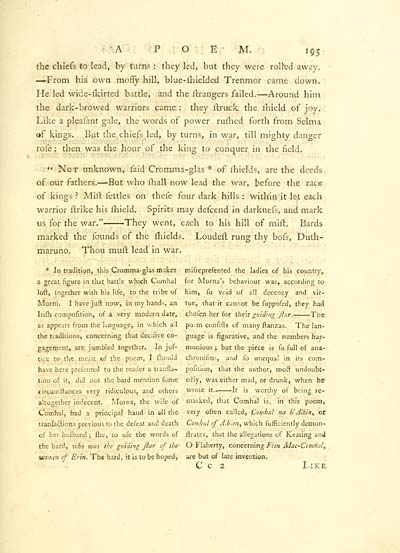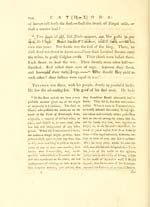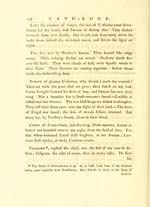Download files
Complete book:
Individual page:
Thumbnail gallery: Grid view | List view

•A P O EM. 195-
the chiefs to lead, by turns : they led, but they were rolhed away.
— From his own mofly hill, blue-fliielded Trenmor came down.
He led wide-fkirted battle, and the llrangers failed. — Around him
the dark-browed warriors came : they ftruck. the ihield of joy.
Like a pleafant gale, the words of power ruflied forth from Selma
of kings.. .But the. chiefs led, by turns, in war, till mighty danger
rofe: then, was the hour of the king to conquer in the field,
" Not unknown, faid Cromma-glas * of ihields, are the deeds
of our fathers. — But who fhall now lead the war, before the race
of kings ? Mift fettles on thefe four dark hills : within it let each
warrior ftrike his rtiield. Spirits may defcend in darknefs, and mark
us for the war." They went, each to his hill of mift. Bards
marked the founds of the fliields. Loudeft rung thy bofs, Duth-
maruno. Thou muft lead in war.
* In tradition, this Cromma-glas makes mifreprefented the ladies of his country,
a great figure in that battle which Comhal for Morna's behaviour was, according to
loft, together with his life, to the tribe of him, fo void of all decency and vir-
Morni. I have juft now, in my hands, an tue, that it cannot be fuppofed, they had
Irifli compofition, of .a very modern date, chofen her for \.he\r guidii:^ Jicr. The
as appears from the Lnguage, in which all po;m confifts of many flanzas. The lan-
the traditions, concerning that decilive en- guage is figurative, and the numbers har-
gagement, are jumbled together. In juf- monious ; but the piece is fo full of ana-
tice to the merit of the poem, I fhould chronifm?, aad fo unequal in its corn-
have here prefented to the reader a traiifla- pofition, that the author, moft undoubt-
tion of it, did not the bard mention feme ediy, was either mad, or drunk, when he
circuniftances very ridiculous, and others wrote it.. It is worthy of being re-
altogether indecent. Morna, the wife of marked, that Comhal is, in this poem,
Comhal, had a principal hand in all the very often called, Comhal na h'Albin, or
tranCictions previous to the defeat and death Comhul of Aibion, which fufficiently demon-
of her hufband; fhe, to ufe the words of flratcs, that the allegations of Keating anj
the bard, ivho was the guiding Jlar of the O Flaherty, concerning Fion Mac-Ctmnal,
women of Erin. The bard, it is to be hoped, are but of late invention.
C C 2 LiKR
the chiefs to lead, by turns : they led, but they were rolhed away.
— From his own mofly hill, blue-fliielded Trenmor came down.
He led wide-fkirted battle, and the llrangers failed. — Around him
the dark-browed warriors came : they ftruck. the ihield of joy.
Like a pleafant gale, the words of power ruflied forth from Selma
of kings.. .But the. chiefs led, by turns, in war, till mighty danger
rofe: then, was the hour of the king to conquer in the field,
" Not unknown, faid Cromma-glas * of ihields, are the deeds
of our fathers. — But who fhall now lead the war, before the race
of kings ? Mift fettles on thefe four dark hills : within it let each
warrior ftrike his rtiield. Spirits may defcend in darknefs, and mark
us for the war." They went, each to his hill of mift. Bards
marked the founds of the fliields. Loudeft rung thy bofs, Duth-
maruno. Thou muft lead in war.
* In tradition, this Cromma-glas makes mifreprefented the ladies of his country,
a great figure in that battle which Comhal for Morna's behaviour was, according to
loft, together with his life, to the tribe of him, fo void of all decency and vir-
Morni. I have juft now, in my hands, an tue, that it cannot be fuppofed, they had
Irifli compofition, of .a very modern date, chofen her for \.he\r guidii:^ Jicr. The
as appears from the Lnguage, in which all po;m confifts of many flanzas. The lan-
the traditions, concerning that decilive en- guage is figurative, and the numbers har-
gagement, are jumbled together. In juf- monious ; but the piece is fo full of ana-
tice to the merit of the poem, I fhould chronifm?, aad fo unequal in its corn-
have here prefented to the reader a traiifla- pofition, that the author, moft undoubt-
tion of it, did not the bard mention feme ediy, was either mad, or drunk, when he
circuniftances very ridiculous, and others wrote it.. It is worthy of being re-
altogether indecent. Morna, the wife of marked, that Comhal is, in this poem,
Comhal, had a principal hand in all the very often called, Comhal na h'Albin, or
tranCictions previous to the defeat and death Comhul of Aibion, which fufficiently demon-
of her hufband; fhe, to ufe the words of flratcs, that the allegations of Keating anj
the bard, ivho was the guiding Jlar of the O Flaherty, concerning Fion Mac-Ctmnal,
women of Erin. The bard, it is to be hoped, are but of late invention.
C C 2 LiKR
Set display mode to: Large image | Transcription
Images and transcriptions on this page, including medium image downloads, may be used under the Creative Commons Attribution 4.0 International Licence unless otherwise stated. ![]()
| Early Gaelic Book Collections > Ossian Collection > Temora, an ancient epic poem, in eight books > (207) |
|---|
| Permanent URL | https://digital.nls.uk/82195783 |
|---|
| Description | Selected books from the Ossian Collection of 327 volumes, originally assembled by J. Norman Methven of Perth. Different editions and translations of James MacPherson's epic poem 'Ossian', some with a map of the 'Kingdom of Connor'. Also secondary material relating to Ossianic poetry and the Ossian controversy. |
|---|
| Description | Selected items from five 'Special and Named Printed Collections'. Includes books in Gaelic and other Celtic languages, works about the Gaels, their languages, literature, culture and history. |
|---|

